Letter from Lily Macalester to Charles Macalester
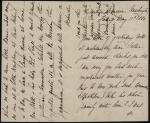
Lily Macalester writes her father, Charles Macalester, regarding her stay at the White House with her friend, First Lady Harriet Lane.


Lily Macalester writes her father, Charles Macalester, regarding her stay at the White House with her friend, First Lady Harriet Lane.

US Senator Eli Saulsbury (Class of 1843) asks Benjamin Perley Poore to make a correction in the Congressional Directory.

George Chambers, trustee of Dickinson College, informs Secretary of the Treasury Levi Woodbury about Representative Thomas McCullough's request that his son, Alexander McCullough, receive an appointment in the United States Navy.

This is a carbon copy of a letter from Roy Wilkins to Democratic National Committee Chairman Ray C. Bliss, in which Wilkins implores the Party to ensure integrated delegations. Wilkins writes to Chairman John M.

Roy Wilkins writes to John M. Bailey, Chairman of the Democratic National Committee, asking how the Convention intends to implement the 1964 commitment to fully representative delegations.

Secretary of War William Wilkins (Class of 1802) responds William Biddle's questions about bids for harbor improvements in Erie, Pennsylvania.
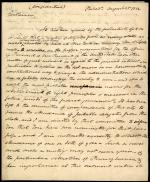
John Bradford Wallace writes to Robert Coleman and James Hopkins, who have been nominated to a secret meeting of Federalists in New York.

Charles F.

The Independent Theosophical League creates this pamphlet to outline policies and positions as well as discuss the reasons to form of an Independent Section of the Theosophical League.

United States House of Representatives Minority Leader Gerald Ford writes to Paul R. Walker (Class of 1921), a longtime contributing editor and columnist for the Harrisburg Patriot-News.

James M. McKim, a member of the Class of 1828 and an editor at the Philadelphia based The Anti-Slavery Standard, writes to a subscriber, Mr. Worrell.
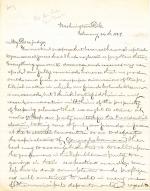
John W. Forney assures Pennsylvania Supreme Court Justice John Meredith Read that he both values and respects his opinions. Mr.
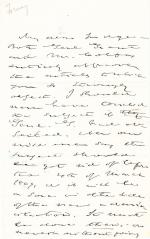
John Wien Forney writes to Judge John M. Read to address his concerns about certain newspaper articles. Forney notes that "both Genl [Ulysses] Grant and Mr.

Associate Justice of the Supreme Court John McLean, who is also a Trustee at Dickinson College, writes to N. Sargent regarding the death of former President John Quincy Adams on February 23, 1848 in Washington, DC.

Jacob Thompson, Secretary of the Interior in President James Buchanan's administration, writes Jeremiah Sullivan Black and asks for advice on what to do about the slander in John Bonner's Child's History of the United States.

J. M. Thompson writes to James Hamilton, a lawyer and member of the Dickinson College Board of Trustees, about the failure of the governor to commission Mr. Steel as a coroner.
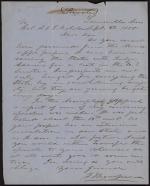
Jacob Thompson writes to Colonel A. O. P. Nicholson and discusses how he expects to win the US Senate seat in Mississippi. Thompson also notes that his speeches have been published in the Memphis Appeal.

United States Attorney General Jeremiah Sullivan Black writes to Jacob Thompson, Secretary of the Interior, with a legal opinion on the question of whether widows of officers and soldiers could receive a government pension if they remarry.
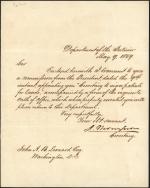
United States Secretary of the Interior Jacob Thompson forwards a commission from President James Buchanan (Class of 1809) to John A. B. Leonard. The commission appoints Mr. Leonard as "Secretary to sign patents for lands."
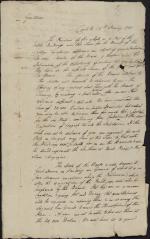
President pro tempore of the Board of Trustees John Armstrong writes to two other Dickinson College trustees, William Irvine and William Bingham, and informs them of a purchase of "public buildings near the Town for the Benefit of the College ..."
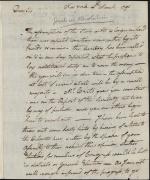
William Irvine writes to John Nicholson about the political situation, especially the assumption of state debts by the federal government and "whether Elections for members of Congress, would be best in districts or general Election." Irvine, a Pe
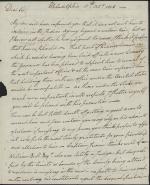
William Irvine writes Secretary of War Henry Dearborn and explains why his son resigned from the Indian Agency.
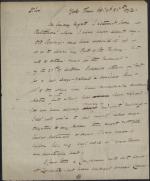
Thomas Hartley writes to William Irvine about his recent return from Baltimore. Hartley also discusses local elections and mentions Montgomery County, Lancaster, as well as Carlisle.
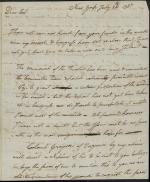
William Irvine writes to Robert Magaw that Dickinson College Trustees' memorial to Congress was favorably reported from committee. Irvine also notes that he has advised Senator William Grayson to send his nephew, a Mr. Orr, to Dickinson.
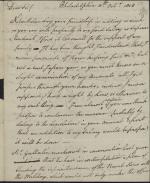
William Irvine, who writes from Philadelphia, explains to Secretary of War Henry Dearborn that his salary as Superintendent of Military Stores is "too small for the support of my family."